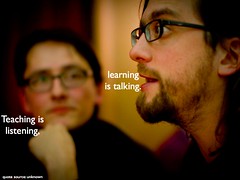Why Don’t People Listen To You?
Posted by Mitch Mitchell on Sep 1, 2014
Yesterday I had lunch with a friend of mine who's recovering from some health issues over the last couple of years. As we were talking and she was telling me some of her plans, I couldn't help but remember, then pass on to her, things I'd advised her to do in the past that would have helped alleviate some of what she was going to be doing now.
 |
It got me thinking about why, even if advice is good, so many people don't take it, or listen to it, even if they asked you for that advice. Of course I came up with an answer; whether it's valid or not, I leave up to you.
In my opinion, much like motivation, people take to it when they're ready for it. I know people, including myself, who couldn't be bothered earlier in their lives with taking time out of their day to read something motivational or listen to something motivational because there were too many other things going on, that now seem to find reasons everyday to consume it because they enjoy the boost it provides. I remember a book titled Illusions that my friend Kelvin gave me in the early 2000's that meant absolutely nothing to me until 2004, when my mind was in a much different place.
When it comes to advice, I often don't like giving it until asked. That's because I'm one of those people who doesn't like unsolicited advice. I know that sounds like a conundrum since I give people advice on this blog all the time but I see this blog as a place where people come to see what I might have to say willingly because they might be looking for a solution. When I'm ready to look for a solution to an issue I'll reach out or research it on my own; I'm like that, so I assume others are like that also.
At the same time, I rarely ask for advice. Instead, I'll ask questions about something specific, part of my researching something, to help me think about something in a better way. I believe that if I ask questions properly that people will give me the responses I need, not necessarily saying what I expect, and that's a type of education that works for me.
When people ask me specifically for advice and I have enough background to give suggestions, rather than telling people what to do, I always expect that they'll take it under advisement, and hopefully do something similar, if not that exact thing, because I always have a basis for what I'm telling someone. If I can't help I tell people I can't, so that I can reduce the probability that I'm giving someone bad advice that won't benefit them.
The thing is that these are often people who I know. What about people I don't know that well or, better yet, what if it's people I work with in some fashion? Should the expectation be that they'll listen better and use the advice more often than anyone else?
 and Wheat Improvement Center via Compfight |
Here's a great leadership lesson for you: never take for granted that people are listening to you, or understand you. Have you ever watched a TV show where someone is giving instructions to others and those people remember everything they're being told? Have you ever sat there trying to remember some of what you heard and realizing that even if you were riveted to the program that sometimes you still have no idea what's going on?
I certainly have. And I've come to realize that if I think something is important enough that not only do I need to make sure I'm not talking too fast or using language that's too vague or too hard to understand, but that once I'm done and I ask the person if they understand what I said to give me their impression of what I just told them and what I hope they're going to do. I find that at least half the time those same folks who told me they got it have no real clue what I've just told them, which means I have to say it again.
This can be frustrating for a leader because they might not feel like they have the time to go over it all again. However, what everyone needs to realize is that there's really only one group of employees that will get it right the first time, every time, and why they get it... military personnel.
Why do they get it? Because they first go through rigorous training where they do something, then do it again and again and again and... you get the picture. The early weeks of being in the military is all about training and precision. Once the basics are learned, all anyone has to do is a quick modification and soldiers get it the first time. They're taught that's the expectation, and if they can't get it they won't be in the military long.
With friends, the only expectation you should ever have is that they at least let you talk to them the first time. With employees, you need to learn that training is always important and that constantly verifying competencies is how you can determine if adding something new to the mix will go smoothly or not. If you as a leader isn't willing to go that far often enough and people can't retain what you're telling them, it's your fault.
Now that I've told you that, and I told you what I do, can you tell me you've understood what I've written here and what to do? Have you read these words and come up with your own plan? Or did you read them and discard them? Leave a comment below and let me know... only if you read this of course. 🙂


Employees generally think of any kind of workplace or responsibility change as ‘extra work’, over and above what they are already doing, for the same money. Friends are more open-minded, because they are interested in their own problem. Giving advice to make someone’s life easier in both cases should be more acceptable to everyone. As usual (and, as you say.), listening to someone’s problem first usually works. Thanks for the post, Mitch.
Thanks for your comment Oliver. Employees need to learn that standing out in positive ways helps get them more… money, attention, responsibilities, freedom… everything.
Hey Mitch, This a very interesting issue raised by you. I have also given many good advices to my friends but they dont really go for it. and if something bad happened to them then they regret for not going for it. I beleive people learn from their experiences.
Archana, people do learn from their experiences. The thing some never seem to learn is that they don’t always have to wait for an experience if someone else has been through it, and that’s too bad.
I Mostly come across people, who don’t listen to your advices much. Today people wants to do what they think will give them profit, even if that going to cost them trouble. So Yes I keep it with myself only.
I can understand that. It’s hard having people not listen to you and then do something that ends up badly. Still, we’re probably the same way here and there.
Employees need to understand the positive role they play in the complete organization, and providing with training & development not only stimulates them towards this, but also creates a motivational instrument for them. Thanks for the post, Mitch.
No problem Amaltas; thanks for your comment. I agree with you here; I don’t think enough leaders take the time to show employees just how important they are to the entire organization.